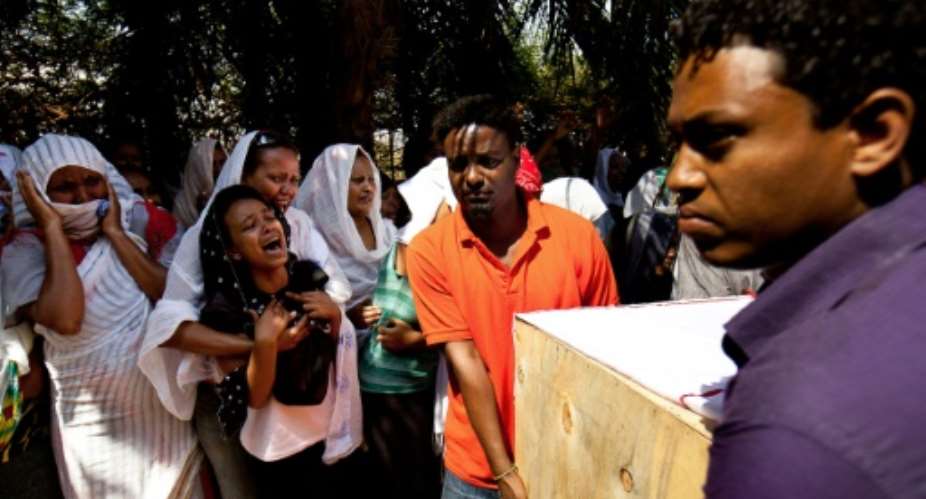Kampala (AFP) - The Ugandan ringleader of a 2010 bombing by the Al-Qaeda-linked Shebab that killed 76 people in Kampala was found guilty along with six accomplices on Thursday of masterminding one of the region's worst attacks in decades.
Twin suicide blasts claimed by Somalia's Shebab targeted football fans watching the World Cup final between the Netherlands and Spain at a restaurant and a rugby club in the Ugandan capital.
Of the 13 men tried, seven were convicted and found guilty of terrorism, murder and attempted murder, and are expected to be sentenced on Friday.
Five others were acquitted of those charges, another was acquitted of lesser crimes.
"I find the seven accused each guilty of terrorism, murder and attempted murder," Judge Alfonse Owiny-Dollo said.
Issa Luyima, a Ugandan, had been shown during the trial to have played a key part in planning the attacks.
"Issa Ahmed Luyima, according to the prosecution, planned the attacks but left Uganda the day before the blasts to evade arrest," Owiny-Dollo told the court as he read a lengthy verdict lasting most of the day.
He added that he then "threw the phone used to coordinate the attacks in a pit latrine to evade arrest" but it was later recovered.
Prosecutors said Luyima had gone to Somalia where he trained with Shebab.
"The prosecution has proved beyond reasonable doubt that Issa Ahmed Luyima masterminded the 2010 bombing and is hereby found guilty of the terrorism as charged," said Owiny-Dollo.
- Heavy security -
The 13 men -- from Uganda, Kenya and Tanzania -- were tried on a range of charges including terrorism, murder and membership of a terrorist organisation.
The men, all of whom pleaded not guilty, were brought to the High Court in Kampala under heavy security, with roads and shops around the court closed.
Judge Owiny-Dollo, who began to read the verdicts mid-morning, could apply the death sentence to those found guilty.
Two men were already found in guilty in 2011 for their role in the attacks.
Edris Nsubuga, who admitted terrorism charges, was spared the death penalty because he expressed contrition over the carnage and was jailed for 25 years.
Co-accused Muhamoud Mugisha received five years for conspiracy to commit terrorism.
The Kampala trial was delayed after the lead prosecutor was murdered in March 2015. Joan Kagezi, acting assistant director of public prosecution, was shot dead by men on a motorbike as she drove home with three of her children.
Al-Shebab continues to target countries in the region, carrying out the 2013 assault on the Westgate Mall in Nairobi that killed at least 67 people, and the attack on Kenya's Garissa university in April 2015, killing at least 148 people.
Although the main Shebab force is Somali-led and operates mainly inside southern Somalia, it has since branched out with franchises operating in regional nations.
Thousands of Ugandan troops form the backbone of the African Union Mission in Somalia (AMISOM), the UN-backed force established to fight the Shebab Islamists and protect the internationally recognised government.





 Former Kotoko Player George Asare elected SRC President at PUG Law Faculty
Former Kotoko Player George Asare elected SRC President at PUG Law Faculty
 2024 elections: Consider ‘dumsor’ when casting your votes; NPP deserves less — P...
2024 elections: Consider ‘dumsor’ when casting your votes; NPP deserves less — P...
 You have no grounds to call Mahama incompetent; you’ve failed — Prof. Marfo blas...
You have no grounds to call Mahama incompetent; you’ve failed — Prof. Marfo blas...
 2024 elections: NPP creates better policies for people like us; we’ll vote for B...
2024 elections: NPP creates better policies for people like us; we’ll vote for B...
 Don’t exchange your life for wealth; a sparkle of fire can be your end — Gender ...
Don’t exchange your life for wealth; a sparkle of fire can be your end — Gender ...
 Ghana’s newly installed Poland train reportedly involved in accident while on a ...
Ghana’s newly installed Poland train reportedly involved in accident while on a ...
 Chieftaincy disputes: Government imposes 4pm to 7am curfew on Sampa township
Chieftaincy disputes: Government imposes 4pm to 7am curfew on Sampa township
 Franklin Cudjoe fumes at unaccountable wasteful executive living large at the ex...
Franklin Cudjoe fumes at unaccountable wasteful executive living large at the ex...
 I'll 'stoop too low' for votes; I'm never moved by your propaganda — Oquaye Jnr ...
I'll 'stoop too low' for votes; I'm never moved by your propaganda — Oquaye Jnr ...
 Kumasi Thermal Plant commissioning: I pray God opens the eyes of leaders who don...
Kumasi Thermal Plant commissioning: I pray God opens the eyes of leaders who don...
